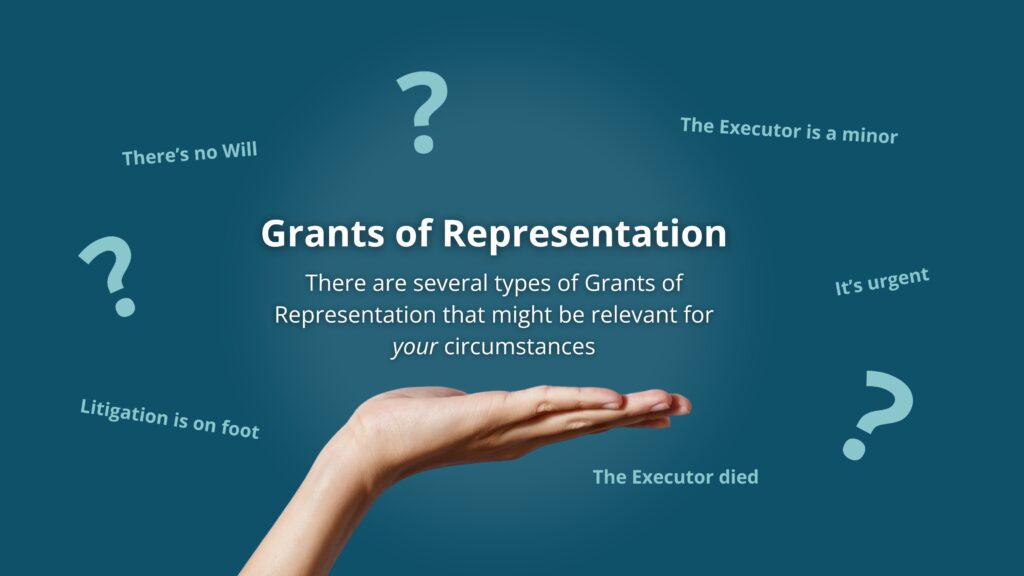What is a Grant of Representation?
A Grant of Representation is a legal document from the Probate Office of the Supreme Court that authorises an Executor or Administrator (known as the Legal Personal Representative or ‘LPR’) to handle the deceased person’s assets. Since July 2020, these grants are issued electronically.
There are several types of grants of representation, each serving different purposes depending on the circumstances of the estate. This article explores the main types of grants and some of the more specialised grants available in Victoria.
If you want to learn more about how to obtain a Grant of Representation, please read our article ‘Grants of Representation: what they are and how to get one’.
Main types of Grants:
In most instances, the Grant of Representation will fall into one of these categories:
- Probate: This Grant is issued to the Executor named in a valid Will. It formally authorises the Executor to manage and distribute the deceased’s estate according to the terms of the Will.
- Letters of Administration with the Will annexed: This Grant is used when there is a valid Will, but the named Executor is unable or unwilling to apply for the Grant. In such cases another person, usually a beneficiary, can apply to become the Administrator and administer the estate according to the Will.
- Letters of Administration: This Grant is necessary when there is no valid Will. It allows the closest next-of-kin or another eligible person to be appointed as Administrator to manage and distribute the deceased’s estate according to the laws of intestacy.
Special Grants:
- Reseal of a foreign or interstate Grant: a reseal of a Grant is issued when a Grant has already been obtained in another jurisdiction, and the estate includes assets located in Victoria. This process allows the foreign Grant to be recognised and enforced in Victoria.
- Letters of Administration Ad Colligenda Bona (to collect the goods of the deceased): this is a limited Grant that is issued where urgent action is necessary to protect the deceased’s estate, such as securing assets that are at risk of deteriorating or being lost. It allows a person to gather, maintain, and protect assets of a precarious or perishable nature where there is an unavoidable delay in obtaining a general Grant of Representation. For instance, where the deceased signed a contract of sale and died before settlement, a person could apply for this Grant so that they could complete settlement and avoid costs to the estate.
- Letters of Administration de Bonis Non (of goods not administered): this Grant is issued when an Executor or Administrator who obtained a Grant has subsequently died, resigned, or is otherwise unable to complete the administration of the estate. The Court appoints a new Administrator to finalise the administration.
- Letters of Administration Pendente Lite (pending litigation): if there is litigation underway about the validity of the Will or the revocation of a Grant, this Grant can be issued to allow the administration of an estate to continue while litigation of a claim is ongoing. It usually allows Administrators to call in and liquidate estate assets and but not to distribute them until the proceedings have been resolved.
- Letters of Administration Ad Litem (for the suit): this is a limited Grant that gives authority to a person to represent an estate in litigation. It is necessary when an estate requires a representative to take part in legal proceedings, but a full Grant has not yet been obtained.
- Letters of Administration Durante Dementia (during dementia): this Grant is issued when an Executor or Administrator does not have the capacity to finalise the administration of the estate due to a lack of mental capacity.
- Letters of Administration Durante Minore Aetate (during minority): this Grant is issued when an executor is under 18 years old and a person is needed to step in and manage the estate until the nominated executor turns 18.
- Letters of Administration Durante Absentia (during absence): this Grant is issued when an Executor or Administrator lives outside the jurisdiction of the estate and cannot effectively manage the estate.
How can Novum Law Group assist you?
Navigating the complexities of estate administration and the various types of Grants of Representation can be challenging. At Novum Law Group our Estates team provide expert guidance and support throughout the entire process. Our experienced team can assist with applying for Grants, managing estate disputes, and all aspects of the estate administration process.
If you would like more information or require advice about an estate, our Wills & Estates Team would be glad to assist you. Please call us on 9063 0300, send us an email to discuss with one of our lawyers, or click here to make an appointment.
Author

Sheredyn Legg

Stephen Fries
The information provided in this article is for general informational purposes only and is not intended to serve as legal advice. For specific legal concerns, please speak directly with one of our qualified lawyers.
Liability limited by a scheme approved under Professional Standards Legislation.





